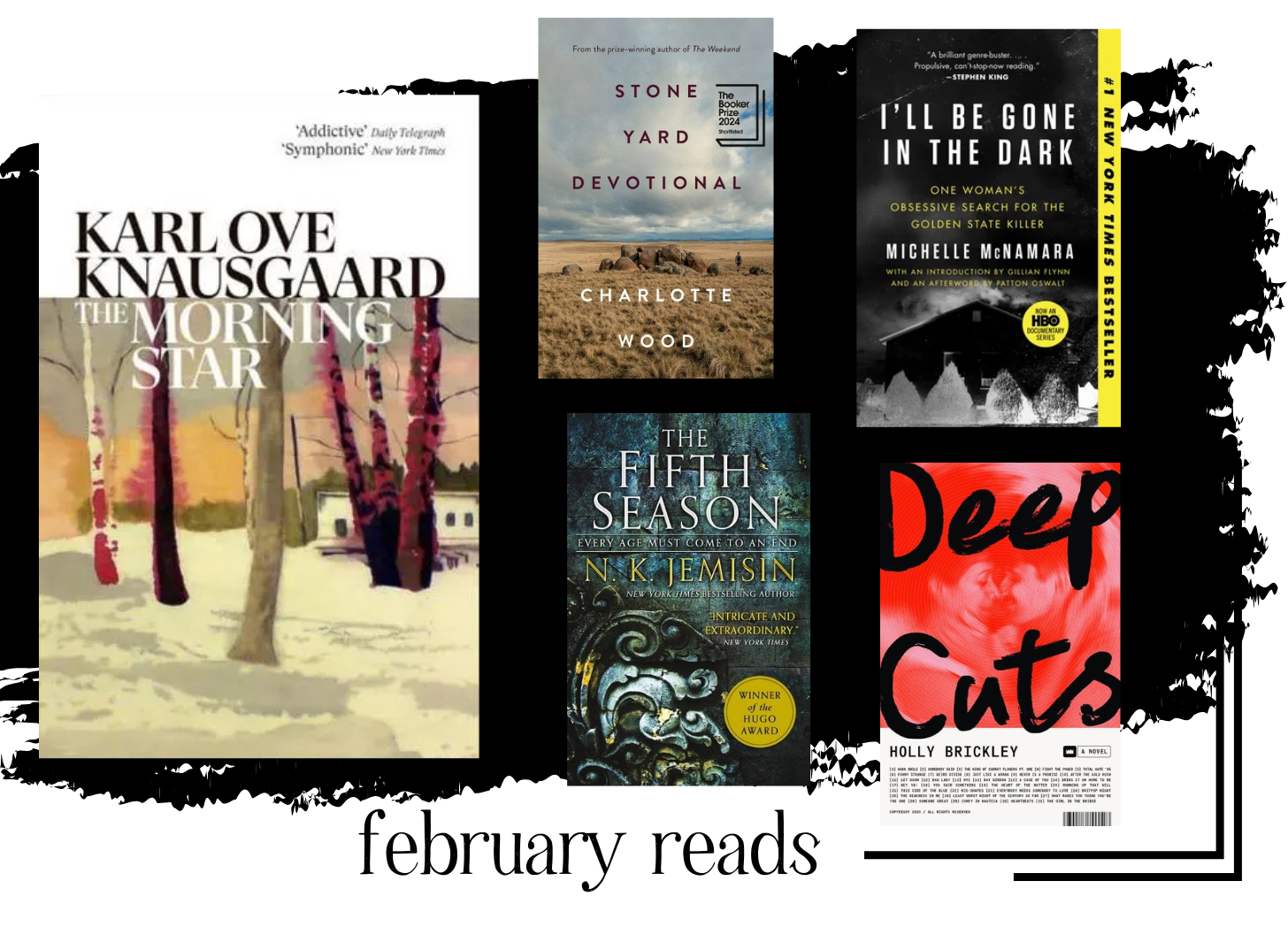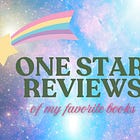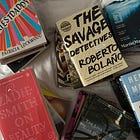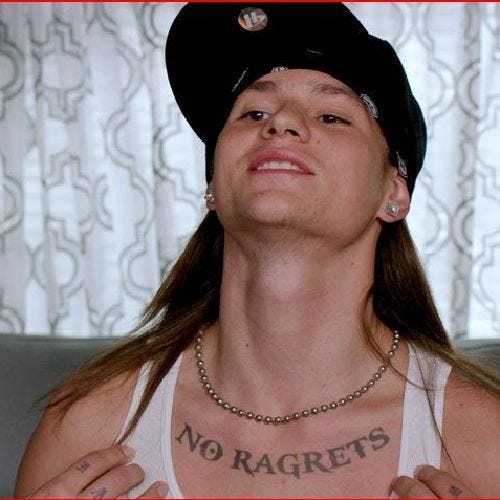February reads, not the end of the english major
February book reviews plus my faith in the humanities and chicken shop dates
I feel like I have lived eight lifetimes since January 20th, so it’s delightful that I have been able to read anything, much less finish five books this month. I have passed the disassociation stage of grief, through the comfort TV period, and am now onto the rage and action bit, which somehow includes reading. I am grateful to have this space here with you to talk about books and the things that make life worth living. At least some of you readers are not American, so thank you for bearing witness every week to our collective anxiety.
We had a panel this week at work on the topic of “constitutional crisis,” and it has me in my feels. As someone with a humanities degree who now works for a humanities & social sciences college at a major state university, I am immeasurably proud of the work our faculty do. The humanities have long been under duress (re: The End of the English Major), partly because it is easier to measure the economic value of a nursing degree than a history one. However, this week, the humanities’ body of knowledge has been in high demand as citizens are looking for guidance on the actions of our federal government. I am grateful for public higher education, and I hope our country continues to value those who seek it.
As for the reading bits, there is no pattern to my selections this month other than indulging in two advanced copies instead of reading all the books I said I was going to read last week. No Ragerts1.
The Morning Star - Karl Ove Knausgaard translated by Martin Aitken
As I mentioned last week, I was intimidated to read The Morning Star because of Knausgaard’s much-lauded My Struggle six-part memoir series, which is a reference to Hitler’s Mein Kampf. Anyone who can tackle such a project must be a formidable writer!
The Morning Star, the first in a trilogy about the hot August day a mysterious new star appears in the Southern Norway sky, is readable and addictive. There is a massive cast of characters: Arne is trying to contain Tove as she has a mental break while on vacation; Kathrine is flying home to preside over a funeral while considering a divorce; Jostein is out getting sloshed when he gets a call to cover a Satanic murder; Egil is at home contemplating the nature of god and why his son hates him; Turid accidentally lets a psych patient escape while scheming for more pills; Emil drops a kid on his head; Iselin is threatened by her landlord’s crazy missing son. At the same time, strange occurrences plague each character, things like a river of crabs, a dead man come back to life, and hallucinations of spontaneous fire eruptions. It’s better than a Housewives episode!
Kausgaard is best when he’s philosophizing about God and the devil or debasing his characters to the lowest levels. Everyone is complicated, and when we live in their heads, we get all of them. A mundane moment - the struggle of making breakfast for children - is juxtaposed with the base - a terrible hangover - and the divine - a reminder of a loved one passed on. Death is ever-present, and a few characters spend pages contemplating the nature of humanity, freedom, religion, and intellectualism. Quite a few are alcoholic or addicted to pills. Some of the men made my eyes roll so far back in my head I almost lost them (your son hates you because you don’t want him, you idiot!!!), and many of the women are self-sacrificial to the point of harm, but I forgive Karl his masculine perspective. It really is this grounding that makes The Morning Star successful - beautiful rather than pedantic or over-intellectualized (although Karl has his moments!).
There, at the moment in which we are made aware of death, we become human.
The novel does feel like a set-up to more, as it is the first in a trilogy. The supernatural elements are compelling enough to keep you reading through the multiple POV switching and detailed slice-of-life moments that are not neatly resolved. At times ruthlessly realistic and brutal, it is an unflinching look at the messiness of life. The threat of death and suffering is palpable, but so is redemption and hope. I am very interested in seeing where the next two novels take us.
The vibes👻: Magnolia2 in book form, a philosopher Chuck Palahniuk, David Mitchell novels
I’ll Be Gone in the Dark - Michelle McNamara
I love true crime, and if you love true crime, you most likely have heard of, if not already read, this true story of one woman’s search for the Golden State Killer. Michelle details her obsession with the unknown killer, how she became an internet sleuth, and inserted herself into the official investigation. It’s about finding the man who terrorized the California suburbs, but it’s also about obsession and answers. Even though Michelle does not live to see Joseph James DeAngelo caught, the moments where Michelle knows that even if she did, it would still not satisfy her why, are moving. That urgent need to understand what leads a human to the most depraved acts is a human condition that can never be truly satisfied. I wish all true crime was written like this. I highly recommend the audio for any true crime lover.
The vibes👻: very modern Ann Rule, confessional, introspective, non-salacious true crime
The Fifth Season (Broken Earth #1) - N.K. Jemisin
This is the way the world ends. For the last time.
My bad for sleeping on THIS novel for entirely too long. Jemisin won the Hugo Award for best novel three damn years in a row for the entire Broken Earth trilogy (!). Can you imagine being another sci-fi/fantasy writer up against this?? I am truly in awe at what Jemisin has accomplished and I am only on novel one.
There is so much happening in this story, but I will do my best: the gist is that we (humanity) are thousands of years in the future, stuck on an almost uninhabitable planet, reorganized into an new society that includes orogenes, people who can move matter with their minds. Ostensibly, these people have mutated in some way from the earth itself, and are the only things standing between us and complete destruction. Naturally, they are feared and reviled. When something goes wrong with an orogene, it sets off a disaster that threatens everything humans have rebuilt. There are converging timelines, multiple POVS, and an extensive amount of new language to learn. Life is precarious and so is this text.
I’ve made complaints previously about authors who do not trust their readers. I wanted to say that Jemisin trusts us, but its not even that, it’s more like an open hostility to the reader, mirroring the open hostility earth has for life upon its surface. At points I was confused, but I let Jemisin drag me where she liked, trusting it would make sense in the end. The inference over explanation method was effective in making me, a white reader, confront my own racial biases. Immediately my mind tried to sort people into modern categories - black or white, hair type, body type - but I realized quickly Jemisin was working from a world where these categories were no longer viable. Race and class dynamics were now based entirely on the liklihood of survival on an angry father earth.
I am always on the search for a book that is both compelling in plot and says something, and you cannot get better than The Fifth Season. I mean honestly, just do yourself a favor and read this book.
The vibes👻: the internet says Brandon Sanderson, The Poppy War, or Octavia Butler, but I cannot personally vouch - this novel was unlike anything I’ve read before.
Stone Yard Devotional - Charlotte Wood
I have heard this book described as quietly moving and I agree. It’s about death in a sad blue way like waves lapping at a desolate shore. It is the first time I have ever genuinely wished a scene in a book had not been written. I loved the way it captures girlhood, those little nuances as to why someone is accepted or not. I appreciated how it tackles death in its multitudes, as well as “trash” as a concept being as worthy of deliberation as the concept of “God”.
In the story, an unnamed woman visits a small religious community in rural Australia, perhaps to deal with long standing trauma, but ends up communing with herself. Although she keeps an emotional distance from the nuns at first, as the book moves along we feel a sense of opening up to the benefits of a simple life among those who believe. She has lost a lot, and left behind some, and seeks answers to those eternal questions. There are also a lot of rats.
Some moments were slightly too pointed, a little obvious in their desire to be poignant, but Wood’s introspective genuis grew on me. Quotes like “The silence is so thick it makes me feel wealthy” or “It’s not an interruption to the work, it is the work. This is the doing” felt fat with ideas to chew on. I would love to know what resonated with others who have read it because I wonder if sometimes my ungodly loud soul misses some of the quieter parts of things. Once I got to the end, I felt I had communed with the part of me that sees death as theoretical, and faced the truth of it.
The vibes👻: a darker Ann Patchett, contemplative somewhat plotless moments in time
Deep Cuts - Holly Brickley
Well this one was fun! I greatly enjoy rock ‘n roll novels, even though I can’t play an instrument to save my life and didn’t appreciate classic rock until maybe ten years ago. The story is about Percy, a UC Berkely student in the early 2000s who is obsessed with music to the point of annoying everyone she meets in a bar. When she finds her match in Joe, a songwriter/musician guy who’s shaggy enough to find attractive, the two set off on a decades-long situationship full of the best early 2000s nostalgia including references only a millennial could love. Things are complicated by feminism, honesty, a gay best friend, insecurity, 9/11, ennui, and that ineffable quality of being a 20-something with nowhere better to be.
What I loved: THE BOOK COMES WITH A PLAYLIST. And if you play it while reading, the songs will line up with the mentions and ostensibly give you that feeling only music can give, allowing the reader to share in the character experience. Although this threatened to devolve into the Garden State argument3, there were a few times I felt actually giddy while immersed in both text and song.
What I struggled with was the in-depth song dissection - I am not a fan of one medium attempting to discuss another medium in its language. Something is lost in translation that feels futile, lacking. I felt the same way about all the video game descriptions in Tomorrow x3. There could have been a lot more character development and a lot less lying around listening to music but then again, at that age I’m sure its more realistic to be engaging in the latter rather than the former. I recommend to anyone who loves lighthearted friendship novels, can appreciate Hall and Oates or Interpol equally, and would own a Delia’s catalog if they still made them.
The vibes👻: Tomorrow x3 meets Daisy Jones but in college.
👻Favorite read of the month: The Morning Star
👻Best new series: The Fifth Season
Thriftbooks.com has been my go-to for a long while when I am on the hunt for weird or unusual covers and generally cheap books, so this piece by
was so so so fun to read, “Inside ThriftBooks, your local library’s low-cost BFF.”I loved The Flirt Behind “Chicken Shop Date,” which is about YouTube creator Amelia Dimoldenberg, mostly because I love hearing about how people get into their random jobs. In the show, Amelia is hilariously deadpan, the guests are game, and it reminds me vaguely of the man-on-the-streets segments of the long-canceled Andy Milonakis Show. The New Yorker doesn't give me gift links (rude), so if you can’t read it, check her out on YouTube (The New Yorker).
The God of the Woods won Book of the Month’s Lolly Award for best book of 2024, and nobody is shocked by this (but I am happy for Liz!)
The Booker Prizes announced the international longlist and there is much excitement over the titles. I already have buddy reads lined up for two of the titles - Solenoid and On the Calculation of Volume. Take this quiz to find out where you should start.
📽️We finally tracked down a used DVD copy of Drop Dead Gorgeous since, apparently, streaming isn’t an option, and it was just as hilarious as I remembered. Severely underrated (if you can get past the excessive use of the R word). We love a good mockumentary.
and cats🐈⬛
toe beans
Finally determined to finish White is For Witching by Helen Oyeyemi. I cannot go a single day longer without having read at least one of her works. I’m finding that letting go and letting god has made my second try at this slightly strange novel much more successful.
Tell me the best thing you read this month.
Tell me something that is giving you joy right now.

The Curator: you're either reading Onyx Storm or you're reading Middlemarch, and it's all the same
This newsletter contains affiliate links. If you purchase using one of the links above, I will earn a baby-sized commission at no cost to you. Comment, share, repost, upgrade to paid, or buy me a coffee to support my work. Follow me @subversereads on Instagram for pretty book pictures. Your support (monetary or not) is why I keep going, so thank you.
See you around the bookshelf!
One of the greatest cinematic achievements of 1999.
the argument being that Garden State is only effective because of the soundtrack to which I argue, that is the entire point!! But an argument for another time.














Things that currently bring me joy: NO RAGRETS; all the inspiring substack booklovers who publish Sunday morning; finishing Nickel Boys and imagining it as required reading for all the people ignorant of American history
I need to finally read NK Jemisan! And White is for Witching creeped me out so much that any deep meaning went over my head 😂